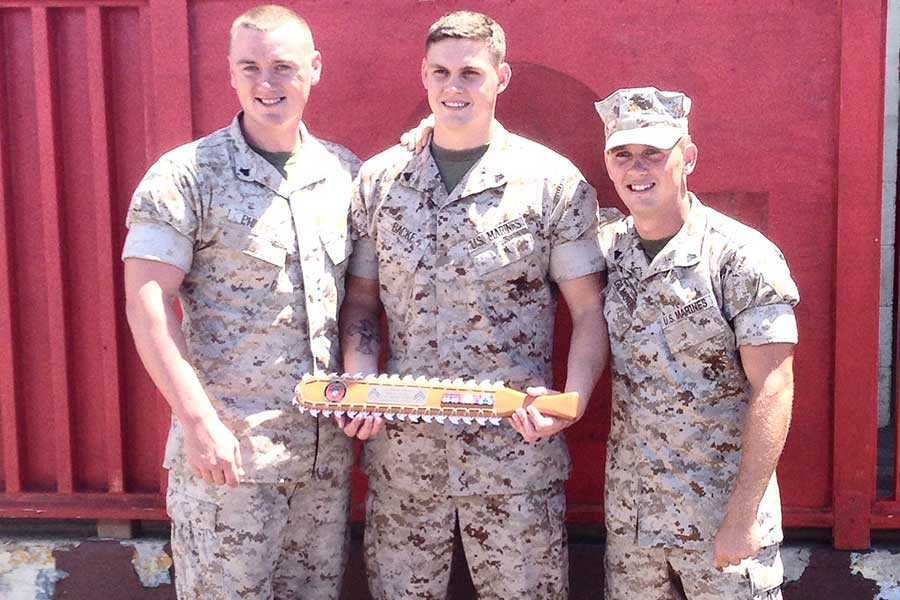I was a gung-ho Marine living in Kaneohe Bay in Hawaii just four years ago. Life seemed bleak at times, even on one of the most beautiful islands this world has to offer, especially my last year there. I watched many of my friends — nay, brothers — depart to various parts of the country. I saw the end of a two-year relationship and, upon departure, I embraced a world of opportunities commonly known as civ-div (civilian division).
I began my journey in Bellingham, Wash., and completed my bachelor’s degree in Ithaca, N.Y. During this time, I experienced ups and downs like you wouldn’t believe. I gained and lost friends trying to navigate the veteran community as a queer veteran at an elite institution, which you may correctly assume is a tricky world to navigate.
On the one side, and while I constantly try to keep this in check, I’ve been groomed to be a killer. I was trained to assume everyone in the room may try to kill me, and that I have to be prepared for that at all times. On the other side, I crave a gay community full of people who understand and accept me, but I sadly have an incredibly difficult time doing so. Understanding queer veterans needs to be addressed.
The other night I decided to go to Voyeur with a friend. I was so excited to have this new friend in this new city. He seemed to be a very nice, sensitive guy. Perhaps we are vulnerable due to a world that constantly told us we are the very word we’ve taken back: queer. Strange. As the night progressed, and as we danced, my heart began to sink. My eyes begin to dart in different directions, and the paranoia set in. I quickly departed the club without telling my friend and made my way outside to catch an Uber. As I was about to get in, my friend berated me with the assumption that I was bored and therefore ditched him. I tried to explain that I needed to get back to the safety of my apartment, but the damage was done. I lost a friend in a new city.
The next day he texted to inform me that we could no longer be friends. He said he didn’t care about my combat-veteran status, and that I was a shitty friend. I’m not a shitty friend. I’m a human being who has seen some of the world’s worst atrocities, from dying children to bombs that would shake the core of Philadelphia. I saw a vehicle get obliterated and the men inside turned to a red paste. Sure, many of us have dealt with homophobia, but tack that onto the stress of war and you get me: Johnathan Gilmore.
There aren’t many people like me, which can feel lonely at times, and while we all want to feel like we’re different and special, the desire to feel normal can consume us. For example, just last night I was walking home from a nice evening at Kensington Quarters when fireworks began to go off. I couldn’t see the sparks, but I heard the booms. My heart sank again. My eyes darted, and the first thought in my head was to dive underneath the nearest car. Yet I proceeded, telling myself, “It’s just fireworks. It’s just fireworks,” while I held back tears and attempted to relax my body to ensure I didn’t make those walking near me uncomfortable. What I wanted to do was grab the nearest person and cry into their shoulder. I wanted to look at someone and tell them, “Help me. Hold me until these fireworks go away,” but people don’t want crazy.
I’m fairly masculine, whether from my Idaho background or my time in the Marines, and this is criticized as toxic masculinity, which I’m fervently against, or internalized homophobia. Neither is true, but the analysis is hurtful, especially when it comes from those I desire to connect with.
But I continue on. I walk the streets of Fishtown on my days off, admiring the beautiful street art and incredible personality this amazing city has to offer. I tell myself that everything is going to be OK when I’m sitting in restaurants fearful that someone is going to kill me. I remind myself that this community does accept me. I mentally affirm, This community will protect me. They’ll understand, which is something I truly hope is the case, but hardly feels that way when I’m in the Gayborhood, which is a huge reason I don’t live there.
So when you meet me or any gay veteran, just remember this: We want connection. We want to be your friend, but we aren’t the best at communicating our fears. It isn’t easy to tell someone, “Hey, sometimes I might randomly leave because I think someone is going to kill me.” It isn’t easy to open up about the traumas of war, but it’s easy to love us. We are loyal and kind, but sadly we are also terrified (sometimes) and we may need time to be alone.
Instead of unfriending us and abandoning us, walk with us. Hold our hands because we need it more than most. We need our community more than ever, and most importantly, we need to be understood. I hope this helps you understand.
Johnathan Gilmore is recent Cornell grad and formerly enlisted combat veteran who focuses on masculinity, veteran awareness, and LGBT issues.
